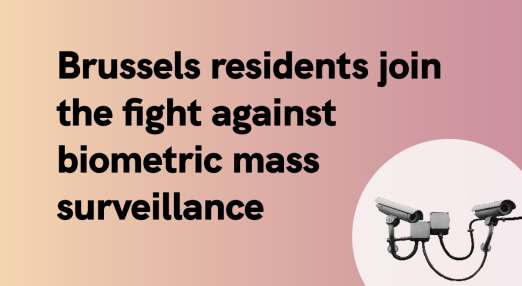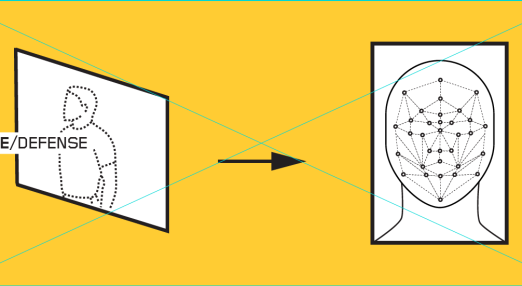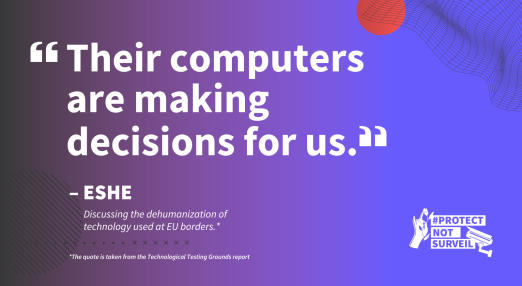As AI Act vote nears, the EU needs to draw a red line on racist surveillance
The EU Artificial Intelligence Act, commonly known as the AI Act, is the first of its kind. Not only will it be a landmark as the first binding legislation on AI in the world – it is also one of the first tech-focused laws to meaningfully address how technologies perpetuate structural racism.
Filter resources
-

As AI Act vote nears, the EU needs to draw a red line on racist surveillance
The EU Artificial Intelligence Act, commonly known as the AI Act, is the first of its kind. Not only will it be a landmark as the first binding legislation on AI in the world – it is also one of the first tech-focused laws to meaningfully address how technologies perpetuate structural racism.
Read more
-

Retrospective facial recognition surveillance conceals human rights abuses in plain sight
Following the burglary of a French logistics company in 2019, facial recognition technology (FRT) was used on security camera footage of the incident in an attempt to identify the perpetrators. In this case, the FRT system listed two hundred people as potential suspects. From this list, the police singled out ‘Mr H’ and charged him with the theft, despite a lack of physical evidence to connect him to the crime. The judge decided to rely on this notoriously discriminatory technology, sentencing Mr H to 18 months in prison.
Read more
-

Civil society urges European Parliament to protect people’s rights in the AI Act
In the run up to the AI Act vote in the European Parliament, civil society organisations call on the European Parliament to prioritise fundamental rights and protect people affected by artificial intelligence systems.
Read more
-

France becomes the first European country to legalise biometric surveillance
EDRi member and Reclaim Your Face partner La Quadrature du Net charts out the chilling move by France to undermine human rights progress by ushering in mass algorithmic surveillance, which in a shocking move, has been authorised by national Parliamentarians.
Read more
-

Protect My Face: Brussels residents join the fight against biometric mass surveillance
The newly-launched Protect My Face campaign gives residents of the Brussels region of Belgium the opportunity to oppose mass facial recognition. EDRi applauds this initiative which demands that the Brussels Parliament ban these intrusive and discriminatory practices.
Read more
-

Open Letter: The AI video surveillance measures in the Olympics Games 2024 law violate human rights
In an open letter, EDRi, ECNL, La Quadrature du Net, Amnesty International France and 34 civil society organisations call on the French Parliament to reject Article 7 of the proposed law on the 2024 Olympics and Paralympic Games.
Read more
-

2023: Important consultations for your Digital Rights!
Public consultations are an opportunity to influence future legislation at an early stage, in the European Union and beyond. They are your opportunity to help shaping a brighter future for digital rights, such as your right to a private life, data protection, or your freedom of opinion and expression.
Read more
-

SERBIA: Government retracts again on biometric surveillance
Another attempt to legalise mass biometric surveillance in Serbia was ditched by the government in a sudden U-turn just as 2022 was drawing to a close. In a little over a year this was the second draft law on internal affairs failing to pass the public hearing stage before its formal introduction to the parliamentary vote.
Read more
-

#ProtectNotSurveil: EU must ban AI uses against people on the move
As the European Parliament regulates the most harmful AI technologies, a coalition of civil society calls on the EU to #ProtectNotSurveil people on the move.
Read more
-

Emotion (Mis)Recognition: is the EU missing the point?
The European Union is on the cusp of adopting a landmark legislation, the Artificial Intelligence Act. The law aims to enable an European AI market which guarantees safety, and puts people at its heart. But an incredibly dangerous aspect remains largely unaddressed - putting a stop to Europe’s burgeoning 'emotion recognition' market.
Read more
-

Phone unlocking vs biometric mass surveillance: what’s the difference?
Facial recognition is one of the most hotly-debated topics in the European Union’s (EU) Artificial Intelligence Act. Lawmakers are more aware than ever of the risks posed by automated surveillance systems which pervasively track our faces – as well as our bodies and movements - across time and place. This can amount to biometric mass surveillance (BMS), which undermines our anonymity and freedom, and weaponises our faces and bodies against us. The article explores the types of biometric technology and their implications.
Read more
-

Remote biometric identification: a technical & legal guide
Lawmakers are more aware than ever of the risks posed by automated surveillance systems which track our faces, bodies and movements across time and place. In the EU's AI Act, facial and other biometric systems which can identify people at scale are referred to as 'Remote Biometric Identification', or RBI. But what exactly is RBI, and how can you tell the difference between an acceptable and unacceptable use of a biometric system?
Read more
